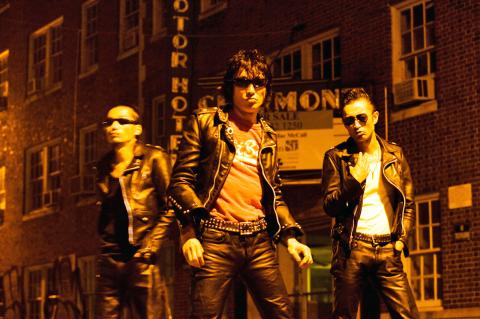Watch out this weekend ’cause a big, bad wolf will be rocking at the door. For the past 20 years, punk rockabilly legend Guitar Wolf — a Japanese three-piece outfit composed of Guitar Wolf, Bass Wolf, and Drum Wolf — have blasted eardrums and broken sound barriers. The group has toured with the Cramps and played with the Jon Spencer Blues Explosion, and made audiences howl at events like Fuji Rock, Rock in Japan and SXSW.
After a tour of Japan in September, the US last month, and a recent Matador Records showcase with Pavement and Sonic Youth, the band is playing in Kaohsiung tonight and Taipei tomorrow.
Matador Records said that when the band sent in the master for its album Jet Generation, the sound engineer said the sound “levels exceeded the theoretical maximum possible on compact disk,” and that it was “the loudest CD in history.”

Photo courtesy of Guitar Wolf
Guitar Wolf’s sound is heavily influenced by the Ramones, with elements of the Boredoms’ future-wave noise punk and what the band calls “Jet Rock,” a tip of the hat to Joan Jett, a long-term inspiration and hero for Seiji (aka Guitar Wolf). He was 18 years old when he first saw her play and was taken “prisoner” by her “leopard eyes,” he said in a recent e-mail interview.
The group’s most popular albums are Planet of the Wolves and Jet Generation. The most soulful is Dead Rock, composed after the original Bass Wolf, Billy, died of a heart attack in 2005 aged 38. The tragedy tempered the band members’ hard-drinking lifestyle, though they still keep a beer machine in their office.
The band’s look and attitude are as important to Guitar Wolf as the music. Seiji’s fashion revolves around a black-on-black theme — omnipresent wraparound shades (one interviewer commented that in 13 years of knowing Seiji he’d only seen his eyes once) and a collection of leather jackets that include one signed by the Ramones, one signed by Joan Jett, and a black-and-white jacket similar to the one Johnny Thunders wore.
Interviewing such a band presents it’s own difficulties.
Asked how he decided to make rock ’n’ roll his life, Seiji wrote: “Human is not to become a person who can become it. It becomes the one wanting to become it.”
Seiji went on to explain that rock ’n’ roll was the best way for him to “keep cool” and to be “popular among lovely girls.”
But what can fans expect from the show?
“If you are bitten by us, you are [in] serious [trouble],” Seiji wrote. “You might [catch] the sickness of intense rock and roll. Give an antirabies serum for the case.”
“Our new album is coming soon,” Seiji wrote. “Anyway, we can’t wait to eat you.”

In the March 9 edition of the Taipei Times a piece by Ninon Godefroy ran with the headine “The quiet, gentle rhythm of Taiwan.” It started with the line “Taiwan is a small, humble place. There is no Eiffel Tower, no pyramids — no singular attraction that draws the world’s attention.” I laughed out loud at that. This was out of no disrespect for the author or the piece, which made some interesting analogies and good points about how both Din Tai Fung’s and Taiwan Semiconductor Manufacturing Co’s (TSMC, 台積電) meticulous attention to detail and quality are not quite up to

It is one of the more remarkable facts of Taiwan history that it was never occupied or claimed by any of the numerous kingdoms of southern China — Han or otherwise — that lay just across the water from it. None of their brilliant ministers ever discovered that Taiwan was a “core interest” of the state whose annexation was “inevitable.” As Paul Kua notes in an excellent monograph laying out how the Portuguese gave Taiwan the name “Formosa,” the first Europeans to express an interest in occupying Taiwan were the Spanish. Tonio Andrade in his seminal work, How Taiwan Became Chinese,

April 21 to April 27 Hsieh Er’s (謝娥) political fortunes were rising fast after she got out of jail and joined the Chinese Nationalist Party (KMT) in December 1945. Not only did she hold key positions in various committees, she was elected the only woman on the Taipei City Council and headed to Nanjing in 1946 as the sole Taiwanese female representative to the National Constituent Assembly. With the support of first lady Soong May-ling (宋美齡), she started the Taipei Women’s Association and Taiwan Provincial Women’s Association, where she

Mongolian influencer Anudari Daarya looks effortlessly glamorous and carefree in her social media posts — but the classically trained pianist’s road to acceptance as a transgender artist has been anything but easy. She is one of a growing number of Mongolian LGBTQ youth challenging stereotypes and fighting for acceptance through media representation in the socially conservative country. LGBTQ Mongolians often hide their identities from their employers and colleagues for fear of discrimination, with a survey by the non-profit LGBT Centre Mongolia showing that only 20 percent of people felt comfortable coming out at work. Daarya, 25, said she has faced discrimination since she